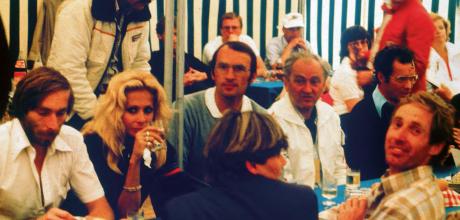24 Hours of Le Mans that took place in 1980 was an odd race by Porsche’s standards
The 24 Hours of Le Mans that took place in 1980 was an odd race by Porsche’s standards. CEO Ernst Fuhrmann had decreed that not only would the 911 not be developed further, but neither would the 936 Sports prototype. Instead, Porsche would campaign at Le Mans with the 924, suitably modified and turbocharged. The transaxle 924 (the 944 was in the wings) and 928 were, in his view, the company’s future. The Porsche racing fraternity was dismayed, while other competitors were puzzled. These GT-class 924s – even with 350bhp – were hardly potential race winners, but Ernst, for whom this would be his last Le Mans with Porsche, was unperturbed.
Total 911 recounts the story behind a famous picture from Porsche’s past…
Taken inside the Porsche hospitality tent two days before the 24 Hours, this photograph shows the CEO, clothed suitably for what was the wettest, coldest Le Mans for years, presiding over a group that’s arrived for lunch. Sitting beside Ernst on his right is press spokesman Manfred Jantke, who wasn’t alone in his gloom at Porsche’s modest ambitions for this year’s race. Next to Manfred is Simone, the-then Mrs Jürgen Barth. The man himself is obviously hungry because he’s already tucking into the bread rolls. Turned and facing the camera is Jürgen’s co-driver, the Lichtensteiner Manfred Schurti, a stalwart of both works and private Porsche teams. He and Jürgen would finish a remarkable 6th in their 924 Carrera GT.
To Ernst’s left in a dark blue jumper is American Peter Gregg, whose success with Brumos 911s had put Porsche firmly on the Trans-Am map in the US. Scheduled to share a works 924 with Al Holbert, he crashed his company 911 in a road accident just before the 24 Hours. Suffering from concussion, he had to withdraw from the race. Peter was 40 and this incident marked the end of his racing career: recurrent headaches and double vision would handicap his performances in the following months. Friends noted his state of depression, and despite getting married in December 1980, Peter was found dead a week later, a suicide note indicating life no longer gave him any pleasure.
This unhappy affair did have a silver lining for one man. To replace Peter in the 24 Hours, Porsche called in Derek Bell. Bumped up unexpectedly to the works team (and a 12thplace finish with Rouse and Dron) Derek, then 39, attributes this promotion to the relaunch of a career that seemed to him to have run its course. In the next decade he would chalk up five Le Mans and three Daytona 24 Hour victories for Porsche, becoming one of the UK’s most garlanded endurance racers in the process.


